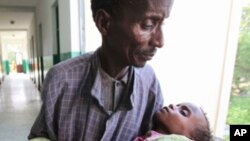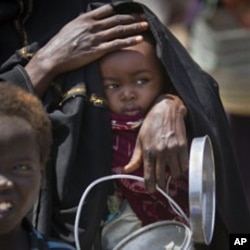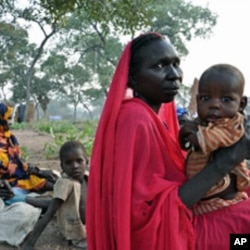The food crisis in the Sahel is deepening, but thanks to early warnings, national and international governments and agencies are already reacting with emergency food supplies. The United Nations Children's Fund (UNICEF) is calling for more than $67 million to address the needs of over one million children who will suffer from acute malnutrition in 2012.
Death, not famine, makes the headlines, says UNICEF's Martin Dawes, when asked about food insecurity in the Sahel.
The charity is calling for nearly $70 million to address the burgeoning crisis occurring in the Sahel territories of Burkina Faso, Chad, Mali, Mauritania and Niger, and the northern regions of Cameroon, Nigeria and Senegal - some of the driest places in the world.
Devastating floods in 2010 that left wells collapsed and crops wrecked, followed by a terrible harvest in 2011and rising food prices across West Africa, have meant hundreds of villages are left with dwindling food supplies.
Malnutrition
UNICEF's Martin Dawes says that over one million children across the Sahel are currently malnourished.
“It’s already a crisis because we have looked at the figures and across the Sahel belt there’s [sic] more than a million children under five who are going to need medical treatment for severe and acute malnutrition," he said. "And this doesn’t also take into account the 1.6 million who will be what we call moderately to acute malnourished. It’s a bad year, there’s been a dip in the production of food, and prices have gone higher. And this is enough to put an awful lot of children from the crisis they face every day where effectively their bodies are being injured, into a deeper crisis where effectively their lives will have to be saved.”
Poor harvest
In the Sahel regions of northern Senegal, arid fields lie bare and cracked with heat, apart from the occasional crop of hardy onions or cabbages, the only vegetables that will grow.
Villagers told VOA that there is nothing left - the remains of the harvest is either eaten, sold, or rotten.
In the village of Ndoye Diagne, people say they are being forced to sell animals and take loans from local merchants to buy small amounts of rice, oil and sugar.
Villager Jare Fall, 30, has five children. She dredges the remaining water from a well and waters a small crop of onions.
She says there aren't many onions this year and does not have enough food to feed her family. She says she needs another well so she can enlarge her patch of land and grow more food otherwise she will have to borrow.
Famine vs. death
But Dawes says the crisis in the Sahel was signaled early by surveys, and while the situation is not making huge headlines, governments and charities are already in emergency mode.
“The sad fact is that many people really say that it isn’t a headline when it’s a famine but it’s a headline when there’s [sic] deaths," he said. "That’s not our job. Our job is to warn, to prevent and to try and ensure that the worst consequences of food insecurity does not happen, that communities are strengthened and most critically of all as far as we are concerned, that the indicators of a bad food crisis, which are children, do not die in droves.”
Emergency measures
Huge quantities of emergency feeds are being bought, such as Plumpy Nut - a peanut-based paste which is a new “miracle” tool to beat famine.
The charity is also building up its emergency response teams and liaising closely with governments.
In northern Senegal, the Red Cross is working to help villages, assessing the needs of individual villagers and providing hygiene and sanitation facilities to help combat other illnesses which come alongside malnutrition.
But both agencies agree that more funds are needed to tackle the crisis in the short term and long term.
“Basically what will save lives in this crisis is when affected children get the right treatment given by a professional in the right place and there is access to those places so that supplies can continue," added Dawes. "It’s cheaper for us to do it now than it would be to fly it all in in the peak of a really intense emergency.”
Malnutrition has long-term effects including irreversible cognitive effects on development and stunting.
UNICEF says 35% of deaths of children under five have malnutrition as their root cause.


















